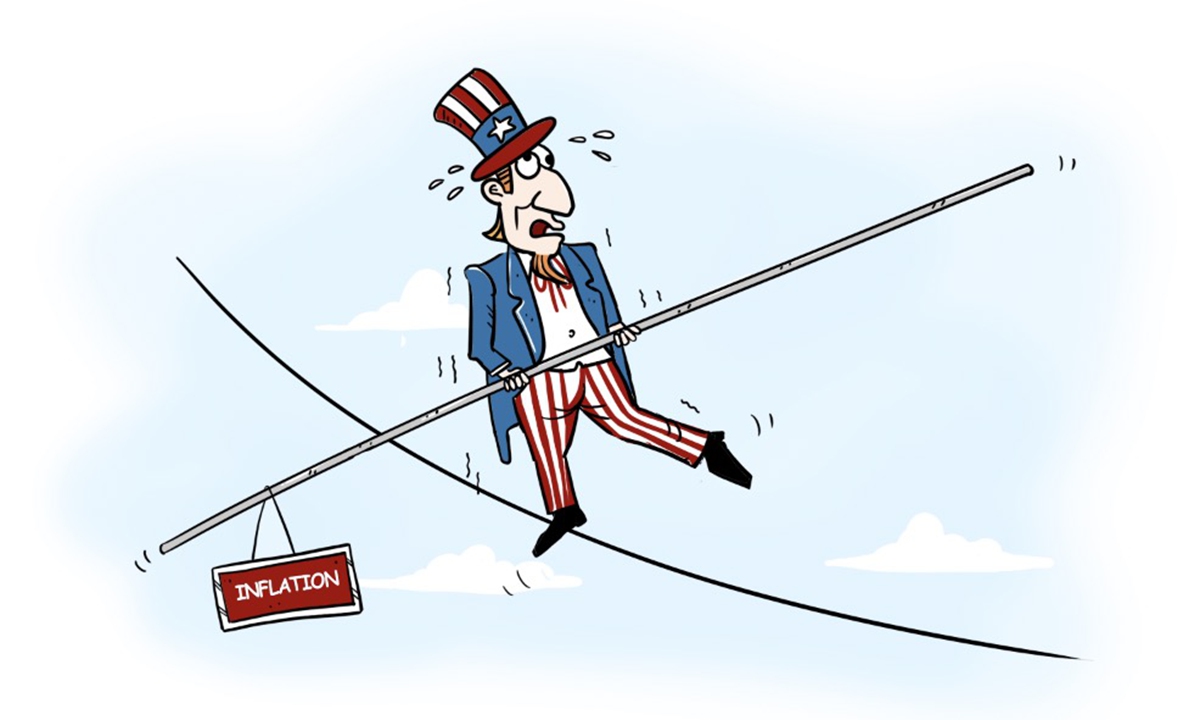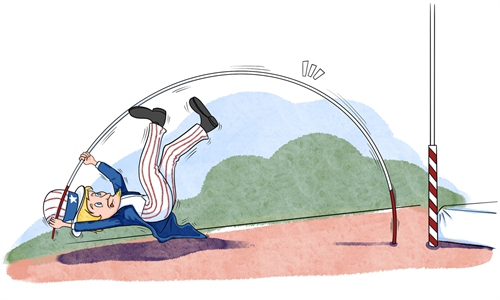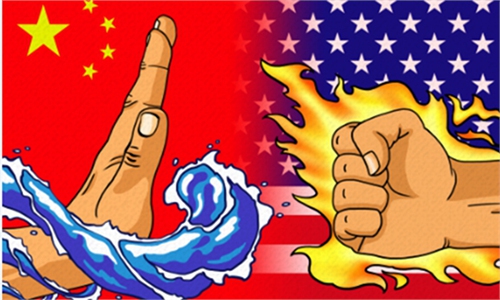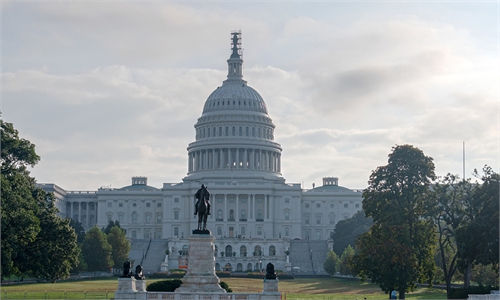COMMENTS / EXPERT ASSESSMENT
Inflation surge lays bare Biden’s economic incompetence

Illustration: Chen Xia/Global Times
Consumer prices surged across the board in the US, with the country's Labor Department reporting on Friday that inflation shot up by 6.8 percent in November from a year ago, marking the sharpest inflationary spike in 39 years. Food prices, housing rent, energy costs and a host of services, all climbed considerably, causing a fresh round of discontent and concern toward the Biden administration's competency in managing the economy.In contrast, China's National Bureau of Statistics said CPI (consumer price index) for November stood at 2.3 percent. Thanks to the government's early measures to encourage hog production and crack down on price gouging by property developers, pork and home prices are both trending down. Lower inflation has relieved pressure on Chinese millennial generation and new college grads.
It is natural for people to ask what has led to the strikingly different economic performances in the world's two largest economies. The answer is evident - the two countries' decision-makers are following two divergent schools of economic management.
The Biden administration, lawmakers in the US Congress and the Federal Reserve are serving their rich constituents above normal Americans, while the Chinese government is seeking "inclusive development" and "common prosperity" - meaning China's economic policies more scientific, reasonable, based on reality, and growth-oriented.
The recently concluded annual Central Economic Work Conference in Beijing has charted a range of new policy tracks for 2022, including stabilizing economic development with a set of more active fiscal and monetary policy to back up infrastructure construction, technology innovation and utilization, and a range of social programs.
Unlike the US government, China's policymakers made it clear during the Conference that anti-monopoly law will be firmly enforced to protect market competition, with a special focus on preventing "big capital" from expanding to numerous sectors and forming oligarchies in China. The Conference articulated that common prosperity is central to the government's coming agenda. This best explains why China in 2021 pursued stricter supervision measures to rein in the likes of Alibaba, Ant, Meituan, Tencent, Didi and other companies.
The results are also sharply different. In China, people are content, buoyant, and feel assured of the country's prospects next year, in five years, and as far out as 2035. Browsing social media in the US, it seems the majority of Americans are airing their grievances about runaway inflation, crumbling infrastructure, failing education, costly medical care, and endless partisan feuding between the Democrats and Republicans in the name of practicing "democracy."
To quote a few responses from American netizens: "I've been seeing consumers spend far more time looking at price tags at grocery and department stores all throughout this pandemic than I did during the worst of the Great Recession. Just today, at a previously reasonably priced store, I saw a package with two pieces of steak being sold for $40+, which is insane." "The stock market has been great but everything else is underwater. Life's necessities have far outpaced any wage growth for the majority of Americans." "How's the economy? Great for the rich, as usual…"
Politicians in the US have always taken the interests of vast ordinary Americans for granted, and the policies coming out the White House, the Capitol and the Federal Reserve have always skewed toward benefiting the American rich.
For the past 6 consecutive months, the US CPI has been elevated at more than 5 percent and kept accelerating pace, eating away the purchase power of Americans. A university undergraduate in economics could even grasp the basic way to tamp down inflation - to immediately draw down the central bank's bonds-buying plan and to raise interest rates from historical low of nearly zero.
But the Federal Reserve, putting the US stock market and society's elites before other people, have stubbornly refused to taper its quantitative easing policy, lest to raise interest rates. The result is clear for everyone to see - skyrocketing inflation being fueled by the Fed.
At the beginning of this year, I have written on this page that the Fed's extraordinarily loose monetary policy would trigger a period of severe inflation in the US, and now, I would predict that if the US government continues to disrupt global industrial supply chain by implementing its protectionist and antagonist trade and technology policy toward China, the world's largest economy will fall into distressing stagflation, soon.
For the Biden administration, the challenge is mounting each day. Biden once vowed to control the pandemic from spreading in the US, but he did a poor job as infections and deaths have kept growing since his coming to power. The backlog of container imports at the biggest US gateways, at Los Angeles, Long Beach and other ports, remains at crisis levels, with the lineup of vessels now stretching across the Pacific. Biden even cannot solve the snarl at the ports, how could he solve the complexities embroiling the US economy?
An example: Biden's Treasury Secretary Janet Yellen said on December 2 that cutting tariffs on Chinese goods will ease the US' price pressure. But last week, she changed her tone contending that "it is possible that policies that people will describe as protectionist are going to be necessary in order to create the appropriate incentives to produce things at home (in the US)". That wavering of stance is regretful. It won't do any good to the US economy. Produce things in the US? So what if it costs five times more? Are you sure struggling Americans won't take to the streets?
The author is an editor with the Global Times. bizopinion@globaltimes.com.cn



